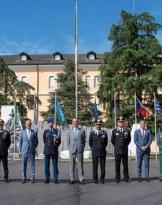The event, organized in synergy between the ministry of health with the ministry of agricultural, food and forestry policies and the General Command of the Carabinieri, will take place on 9 and 10 July, in the Auditorium of the Italian Pavilion Expo Milano 2015.
To illustrate the topical points were present sen. prof. Andrea Olivero, Deputy Minister of Agricultural, Food and Forestry Policies, the Hon. Beatrice Lorenzin, minister of health and the general commander of the Carabinieri, general Tullio Del Sette.
Among the topics covered it emerged that among the aspects that receive constant attention is that of fraud in the food sector. The growing interest in food and the important turnover that surrounds it, both on the rise not only in Italy, can attract those who in this sector see the possibility of easy earnings and are unscrupulous for the health of citizens.
The problem affects the authorities from a product, economic, commercial and legal point of view (this is a type of crime not expressly identified in our legal system, but which is punishable as it falls within other criminal offenses). But above all, the issue is relevant for the health risks that - at least at a potential level - underlie every fraud and every adulteration.
The Italian food safety model and the network that allows it to operate has been enriched in recent months by a new chapter, relating to the fight against fraud, in light of the interest that the European Commission is also showing in the topic. . Italy is at the forefront and actively participates in the construction of the network that will support that of the police bodies, with which it will constantly dialogue: projects are already underway that see civil and police bodies side by side in combating fraud, for example in the food supplements sector.
.jpg)
In support of these statements there are the data that, on the occasion of the press conference, are disclosed on the web portal, included in the 2014 Annual Report of the Integrated National Plan, a planning tool shared by all the sector authorities, coordinated by the Ministry of Health, and to which the ministry for agricultural, food and forestry policies, the ministry of the environment and protection of the territory and the sea, the regions and autonomous provinces, the Customs and Monopolies Agency, the specialized departments of the Carabinieri Command collaborate, the State Forestry Corps, the Port Authorities and the Guardia di Finanza.
The 2014 data give an idea of the solidity and capillarity of the Italian food safety system; it should be remembered that the data relating to the food sector accompanies those, no less important, relating to the veterinary health and animal welfare sectors.
The Local Health Authorities (ASL), through the competent veterinary and food hygiene and safety and nutrition services, carried out 171.327 inspections and 8.051 audits on the establishments for food of animal origin (noting 16.946 non-conformities, relating to structural conditions and equipment ) and controlled 287.823 operating units of food companies (detecting 50.720 irregularities, especially in the catering sector, followed by producers and packers who sell mainly at retail).
The non-conformities found concerned, for the most part, general and personnel hygiene, structures and HACCP (procedures aimed at preventing the dangers of food contamination, ed). 110.757 samples were analyzed by official laboratories, of which 2.008 were found to be non-compliant. For the offenses detected, 66.628 administrative measures were adopted by the ASL and 1.115 crime reports communicated to the judicial authorities.
In implementation of the 2014 National Plan for the research of residues, 40.806 samples were analyzed, of which 16.276 for the search for residues of substances belonging to category A (equal to 39.9% of the total analyzes) and 24.530 for the search for residues of substances belonging to category B (equal to 60.1%).
.jpg)
Border control, another cornerstone of the food safety chain, is carried out directly by the peripheral offices of the Ministry of Health (PIF and USMAF), in coordination with the Customs and Monopolies Agency. I would like to remind you how important in terms of volumes and effectiveness is this activity that the ministry carries out directly; Overall, our offices have carried out documentary checks on over 200.000 batches, physical checks on over 25.000 shipments, over 7.000 and sampling. we recorded 440 "non-admissions" of shipments on the EU territory.
The framework of official controls is completed with the targeted activity carried out on the territory by the Carabinieri for the Protection of Health - NAS.
The activity was enriched by the contribution of the Central Inspectorate for the protection of the quality and the repression of fraud of agri-food products of the MIPAAF (ICQRF), for the control of product quality and the fight against fraud of generic food products and that of different judicial police forces: Port Authorities, Carabinieri for Agricultural and Food Policies - NAC, State Forestry Corps, Finance Police, Customs and Monopoly Agency.
However, we cannot let our guard down in the sector of food safety in general, and in particular in that of fraud; and in this scenario the Conference should be seen, which will give the opportunity, on the first day of the works, to illustrate to the guest technicians, coming from countries participating in the Expo from all over the world, in different sessions characterized by the geographical area of origin of the speakers, the Italian system and encourage discussion between delegates on the most effective actions and on the prospects for creating a collaborative network even larger than the existing one.
On the second day, the Italian production reality and the operation of our technicians will also be shown through visits to farms and production facilities, organized together with industry associations.
Vivo is the hope that the image of Italy will be further strengthened and at the same time the global perspectives to combat the plague of counterfeiting will be enriched, in the spirit of the 2015 Universal Exhibition.
Who are the NAS
.jpg) The Antisophistications and Health Units (NAS) are responsible for carrying out multiple and diversified institutional tasks, most recently summarized in the Ministerial Decree of 26.02.2008, as supplemented by the Ministerial Decree of 28.10.2009, which basically aim to guarantee safety in four macro-areas:
The Antisophistications and Health Units (NAS) are responsible for carrying out multiple and diversified institutional tasks, most recently summarized in the Ministerial Decree of 26.02.2008, as supplemented by the Ministerial Decree of 28.10.2009, which basically aim to guarantee safety in four macro-areas:
• Food (healthiness of food and livestock),
• Health (public and private health, health professions and arts, pets, anti-doping, pharmaceuticals and toys),
• Workplaces and Chemistry.
NAS military personnel attend multidisciplinary training courses of varying duration, based on a cycle of studies that allows officers to obtain a degree in "Law" and / or a First Level Degree in "Security Sciences" and a Specialist Degree in "Internal and External Security Sciences" and to the Inspectors the XNUMXst Level Degree in "Social Security Operators". Furthermore, part of the Marshals staff, who attended dedicated courses and masters, holds the qualifications of "Antidoping Investigative Inspector" and "Oil Tasters".
The Carabinieri Antisophistications and Health Units (NAS):
• exercise the functions of judicial police under the direction of the judicial authority, as they are considered "PG Services" pursuant to art. 56 cpp;
• perform, as supervisory bodies in the sectors covered by art. 4 of DM 26.02.2008, administrative activity of a preventive nature that can evolve in judicial police investigations;
• operate on the initiative or by delegation of the Judicial Authority or at the request of the Ministry of Health or of the territorial Weapon as well as on the reporting of citizens.
Monica Palermo
.jpg)
.jpg)
(photo of the author)












